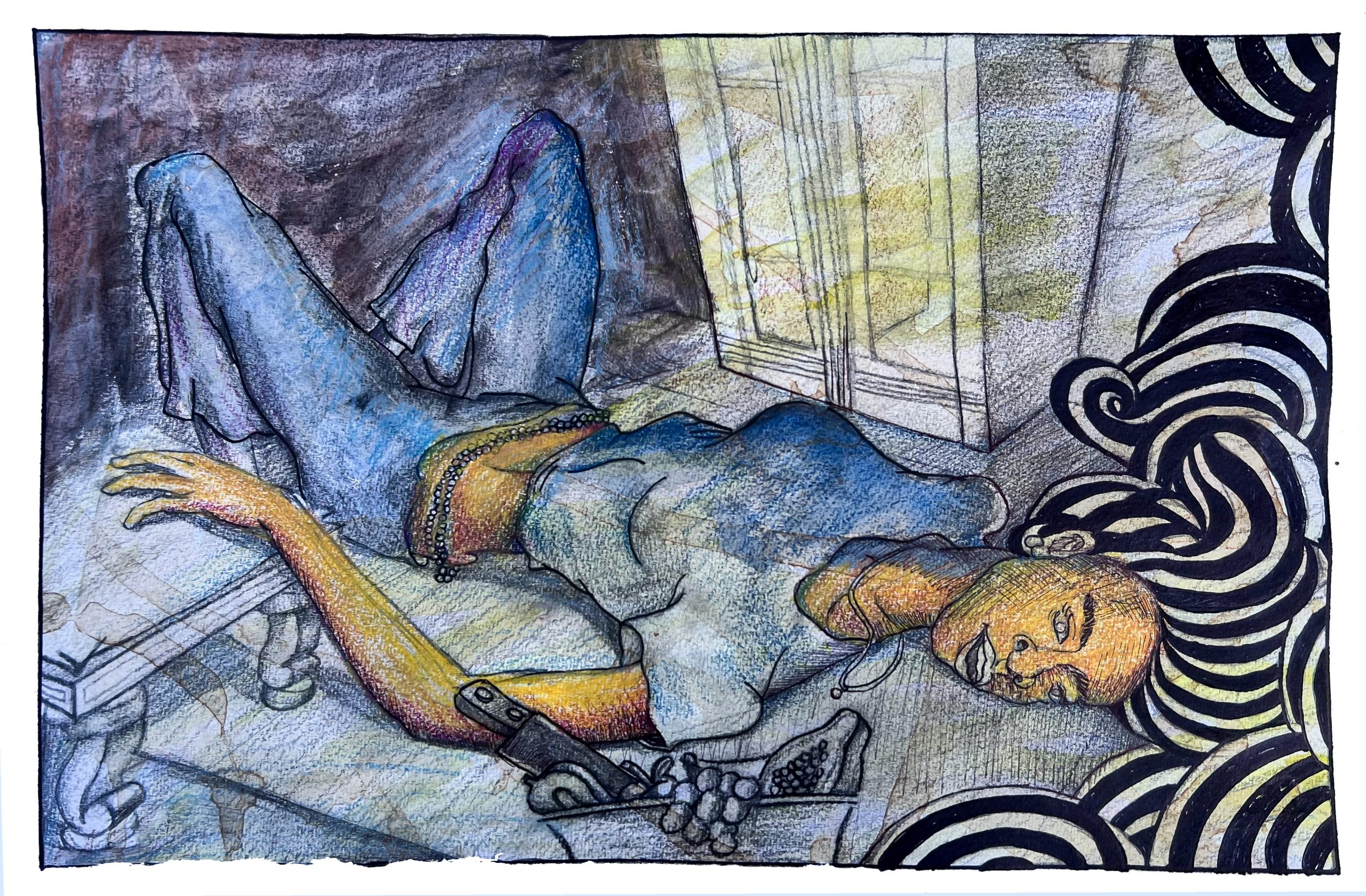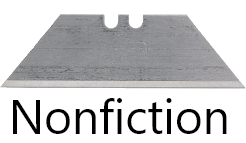The Truth About Unremarkable Things

art by Gerard Pefung
I fainted for the first time in my life last night.
When it happened, I’d been walking across the wooden floorboards in the hallway with the sudden, disturbing awareness that my head felt like a foreign object, somehow disconnected from the rest of my body, from this entire plane of existence. I was clutching a small paring knife in my hand. The last thing I recall before blacking out was the sensation of the sharp blade scraping against a textured wall as I fell. I was extraordinarily lucky I didn’t hurt myself.
After coming back around, I found myself sitting in the corner of a dark alcove, my back against the linen closet door, staring up in confusion at my father as he walked past. He didn’t see me. The bowl of fruit I’d been holding was upright on the floor, the knife lying inside it. I had no idea how much time I’d lost.
When it happened, I’d been bleeding nonstop for eleven days. I felt distraught each time I sensed another mammoth clot leave my body, sending me fleeing to the nearest bathroom. The jelly-like discharge reminded me, at first glance, of fat leeches lounging lazily atop a menstrual pad mattress. The outlandish comparison seemed strangely apt.
Later, my hands shook as I ate leftover meatloaf in my carpeted bedroom. The past four days had felt increasingly hopeless. I’d already convinced myself that death must be imminent. My mother’s youngest sister had begun experiencing similar symptoms the last time I ever saw her, on a rare trip to the homeland sixteen years ago. I still remember standing with her at the airport as she insisted on helping me carry my heavy luggage. She died a year later of cancer. Most of my relatives on both sides succumbed to a variation of the disease at some point. We have amassed an unfortunate family history.
Due to the geographical distance that separated us, my aunt and I had only met in person two or three times. But inside our family album, there’s a black-and-white childhood photo of her posing alongside my mother. I think about it often. Witnessing her young self, immortalized in that picture, is like seeing a snapshot of me at that age. Everyone always told me I looked more like her than my own mother.
*
Twelve hours later, I’m lying on a bed in the ER, enveloped by a hospital gown five sizes too big.
The snap-closure shoulder seams were incorrectly buttoned when a nurse held it out for me to slip over my tiny frame. Even he, a professional, seemed mystified by the disobedient garment. When the next healthcare worker strolled in, she found me overwhelmed by a massive, tangled piece of cloth that resembled an unruly bed sheet. I can only imagine how I must have looked—like a silly child playing dress-up.
Now, an ultrasound technician repeatedly guides the transducer wand across the terrain of my abdomen as if straining to mow a particularly stubborn patch of grass, pushing down with more and more force against my internal organs each time. I wince, trying my best not to cry out. I didn’t think this process was supposed to be so physically painful.
“I can’t find your ovaries,” she finally announces, in a cavalier way that suggests those absent ovaries are merely misplaced keys. In my lightheaded daze, what I hear is: You have no ovaries.
“Is that unusual?” I ask, though I’m afraid of the answer.
“Not at all,” she says. My cloud of a brain is momentarily perplexed by that statement. What I hear is: You are not a woman.
I am not a woman, I think to myself. I have no ovaries.
I’m thankful when the technician finally gives up, the protracted discomfort nearly unbearable. In the end, she couldn’t find my ovaries—they were obscured by bowel gas, though no one bothered to tell me that—but she couldn’t find evidence of any suspected fibroids either. All the intake nurses, who hadn’t leapt to the same conclusions I had last night at dinner, had guessed those benign growths might be the culprit. I hadn’t really understood what they were talking about. In all these years, no one has ever explained them to me.
People wearing masks that obscure the lower halves of their faces continue drifting in and out of the small room. I’ve already had to recount one of the worst weeks of my life at least ten times to ten different people. My heart has been pounding in my chest for days, working overtime without proper compensation. Surely someone has written a record of my story somewhere. Surely I don’t need to keep reliving it.
Though I’ve already submitted both a blood sample and a urine sample for analysis, other people stop by to withdraw more fluids without explaining why, and I’m too exhausted to remember to ask. Maybe they’re required to double-check the numbers before I’m allowed to leave. The doctor, who I can’t place in my memory as the doctor, eventually returns to my bedside. (“Has the doctor come back to talk to you yet?” a nurse asks me at one point. “Um…which one of you was the doctor?” I struggle to recall.) My blood panel shows no abnormalities beyond minor anemia. In the absence of fibroids, I’m officially diagnosed with menorrhagia, a fancy medical term for heavy or prolonged menstrual periods. I’m prescribed medroxyprogesterone tablets. The meds come with a laundry list of potential side effects that, as usual, sound far worse to me than the condition they’re meant to alleviate. An increased risk of cancer is among them.
No one offers to wheel me out, and I’m left to wander the unfamiliar corridors until I reach the exit door. I’m frightened of the paved concrete sidewalks, nowhere safe to land if I pass out again, but I hold tight to the stapled sheaf of discharge papers that contain notes on my diagnosis, with a copy of all the lab test results. On the page detailing my ultrasound scan, words pop out at me in all caps: UNREMARKABLE UTERUS AND ENDOMETRIAL STRIPE. Though I know this to mean that nothing malignant was found, the terminology still strikes me as dismissive and callous. What I read is: YOUR UTERUS IS UNREMARKALBE. What I read is: YOU ARE UNREMARKABLE, IN EVERY WAY.
I feel my body’s betrayal acutely as I shower the day off of me and stumble into my own bed. My relief that I’m likely not dying as soon as I feared is tempered by a frustrating lack of closure. I have this preposterous fantasy that I’ve just been held hostage in a stark and unfamiliar environment for hours, all of my malleable parts poked and prodded by an alien species hoping to make a revelatory discovery about humankind. But after all that turmoil, they’ve simply discarded me back into the wild, my very being deemed generic and unworthy of note. I feel now as if their flying saucer has disappeared into the night sky once again, leaving me here alone to learn the secrets of how to continue living under the opaque cloak of this mysterious skin.


